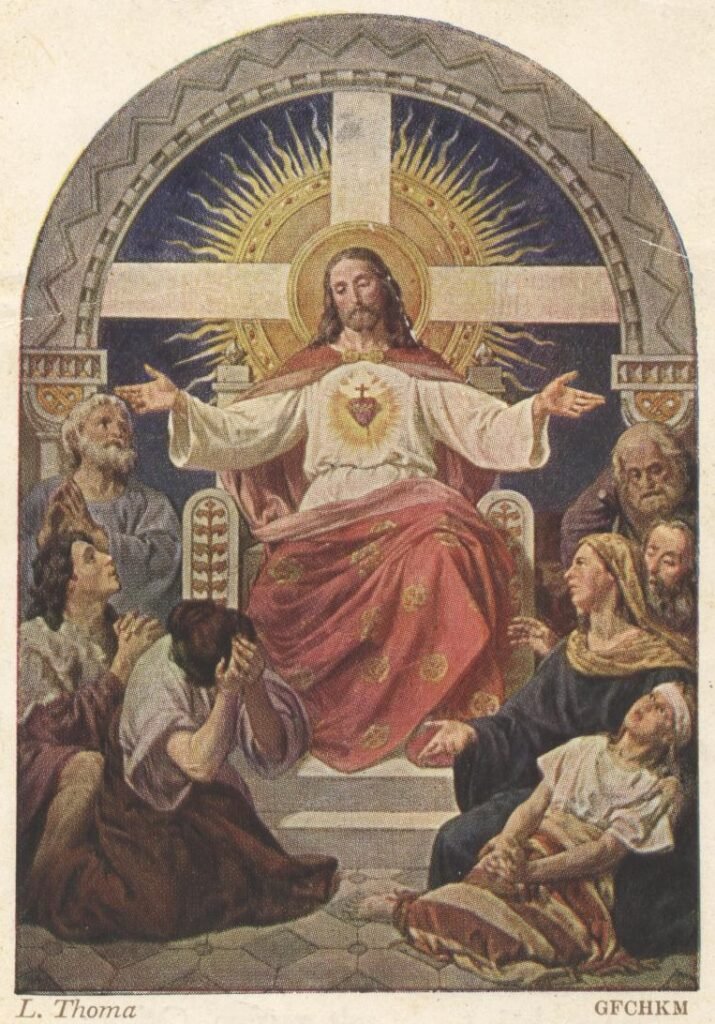A Sermon Preached by Very Rev. Fr. Casimir Puskorius, CMRI
(Spring, 2016)
My Dearly Beloved: Devotion to the Sacred Heart of Jesus is one of the most beautiful, most rich, and most profound devotions that we have in the Catholic Church and it is absolutely theological and powerful in its meaning.
Today as we celebrate the Feast of the Sacred Heart, we are reminded of so many things. We are reminded, first of all, that God became man. I literally believe that we cannot meditate enough on the dogma that Almighty God — the Second Person of the Blessed Trinity — came down from heaven to earth and became a member of our human race.
This shows the incomprehensible love of God for His human creatures. Why would He love His human creatures so much, we who have offended Him and turned our backs on Him? God is in love with His human creatures. He didn’t take on an angelic nature; He didn’t redeem the angels who fell. But He did redeem fallen man and He even became one of them.
So what does that mean? It means that He took on a human body and a human soul. We call this the Incarnation. We also call it the Hypostatic Union: that the Divine nature was joined to a human nature, body and soul, infused into one Person — not two persons as the heresy of Nestorianism declared. One Person, two natures.
Our Lord’s entire human body and soul are adorable in the fullest sense of the word because that human body and soul are united substantially to His Divine nature. Just as our soul permeates every part of our body, so Our Lord’s Divinity permeates every part of His human soul and His human body. And since He has a body, He has a heart. His human heart is, therefore, adorable in the literal sense of the word. Our Lord’s entire human nature, because it is united to His Divinity, is wholly adorable.
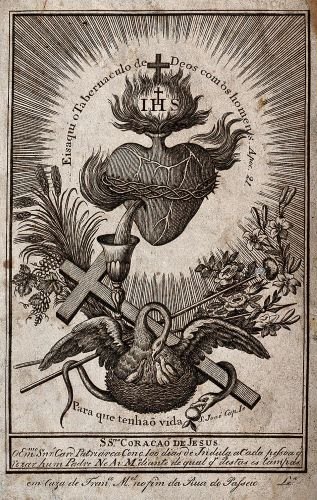
Our Lord literally gave His all — He shed all of His Blood for us, and it was through the wound in His Heart that the last few drops were shed.
The Richness of the Sacred Heart: Symbol of God’s Infinite Love for Man
There is so much to reflect upon today. It is a limitless ocean of reflection. What does the doctrine of the Sacred Heart mean? We know that Our Lord’s Heart is not only adorable in and of itself, but it is also very powerful symbolically because the heart is the symbol of love. When we say that a person is in someone’s heart, we are speaking about their love for that person. Almighty God already loved us infinitely as God before the Incarnation; and from the very first moment of His Incarnation, He began to love us as man as well.
The doctrine of the Sacred Heart was not just invented in recent centuries. When we look at the revelations of Our Lord to St. Margaret Mary, we must not think that this was a new devotion. It always existed, from the first moment of the Incarnation. We see references to the devotion to the Sacred Heart in Scripture itself.
We read in today’s Gospel, for example, how the soldier opened His side. Notice St. John’s choice of words here. Why did the centurion do this? Because he didn’t want to break Our Lord’s legs and he had to make sure He was really dead. Since no one can live with a pierced heart, the soldier — we believe his name was Longinus — took his spear and pierced Our Lord’s heart. The last few drops of Our Lord’s blood were in His heart. This is so profound. From His many wounds He had literally bled to death, not just asphyxiating on the Cross. We can say, then, that Our Lord gave His last drops of blood for us. St. John says that when His heart was pierced, blood and water came out. What was this water? Doctors tell us that there is a sac that encloses the heart called pericardium and it has a clear fluid in it. When Our Lord’s heart was pierced, it looked like not just the blood coming out but water as well — the fluid that was around Our Lord’s heart.
This brings to mind something very interesting in the Mass. At the Offertory the servers bring wine and water to the priest, who puts the wine into the chalice and adds a few drops of water. Is not this a very powerful reminder of the blood and water coming out of Our Lord’s side? Our Lord gave His all, not just in the metaphorical sense: He literally gave His all — He shed all of His blood for us and it was through the wound in His heart that the last few drops were shed.
When Our Lord rose from the dead He kept that wound. Miraculously! Who can live with a hole in his heart? Nobody, but miraculously Jesus will live for all eternity with that gaping wound in His heart. Not only that, but He still has the wounds in His hands and feet, as we are told by Scripture as well. He said to Thomas, “Bring here thy finger, and put it into My wounds. Put thy hand into My side, and be not faithless but believe.” Why did Our Lord keep His five wounds? Why will He keep them where the saints and angels behold them for all eternity? Wouldn’t you think that if He rose from the dead, there would be no scars, not a trace of wounds in His glorified body? But no; He deliberately chose to keep those five wounds. It was not just so Thomas could put his finger into them, but also so that we would know that we have a refuge in those wounds. We can, in a spiritual sense, take refuge in His heart, in the wounds of His hands and feet. His wounds are open, especially the wound in the heart. It is open for you to go in there and partake of His love. Those wounds are the proofs of His love which He wants to bear for all eternity, and a reminder to us of the spiritual refuge that we have in His heart.
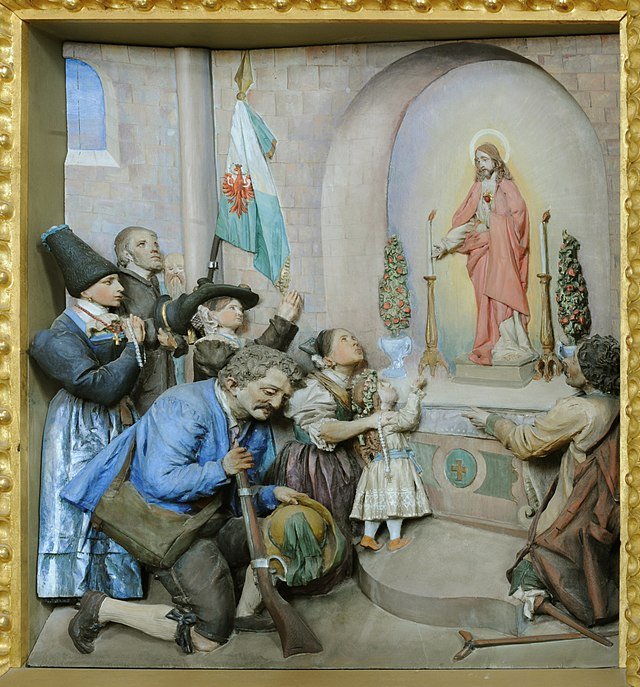
The Sacred Heart Has Loved Us, and Will Continue to Love Us, for All Eternity
I came across a book of meditations by a priest on the Litany of the Sacred Heart of Jesus. He gives many pages of reflection on each of the invocations of the Litany of the Sacred Heart. I would like to briefly touch upon the first three:
Heart of Jesus, Son of the Eternal Father: Remember how much the Father loved us that He sent His Son to die. The Heavenly Father doesn’t have a human heart, but His Son does. When the Second Person of the Blessed Trinity became Incarnate, He began to experience everything that we feel in our emotions especially, which are symbolized by the heart. We suffer in the heart. We say that we are heart-broken when the worst things happen in our lives. They say that Pope St. Pius X, the same saintly Pontiff who established the diocese of Spokane and assigned its first bishop, died of a broken heart when World War I broke out. We use this phrase to show how much we feel and what we suffer inside. The Heart of the Son felt the cost and the pain and suffering that would be entailed by His becoming man. We will never grasp this love fully — the love of the Father and of the Son — the love of the Father condemning His Son to death for His human creatures.
Heart of Jesus, formed by the Holy Ghost in the Virgin Mother’s womb: Modern science tells us things that could never have been known centuries before – for example, that the human heart begins to beat some three weeks after conception. It’s detectable. It is a wonderful thought to know that the Holy Ghost formed the heart of Jesus in His Mother’s womb at the Incarnation, and that from the time of the Incarnation to the time Jesus died on the Cross that heart was beating. Just like ours is beating right now. What would happen if your heart were to stop beating? You would die within minutes. Our heart beat all through the night last night. We didn’t think about it. Thank God it didn’t stop, or we wouldn’t be here this morning; we would be dead. Our heart has to beat. Our Lord’s heart stopped on the Cross. This does not mean that He stopped loving us, but the heart physically and literally died with the body. At the Resurrection the Sacred Heart began to beat again, and it will never stop beating for the rest of eternity. It’s beating right now in His glorified state. We talk about somebody’s heart beating for love of somebody else. Well, the Sacred Heart is beating for love of His human creatures and it will always be for all eternity. It will never stop.
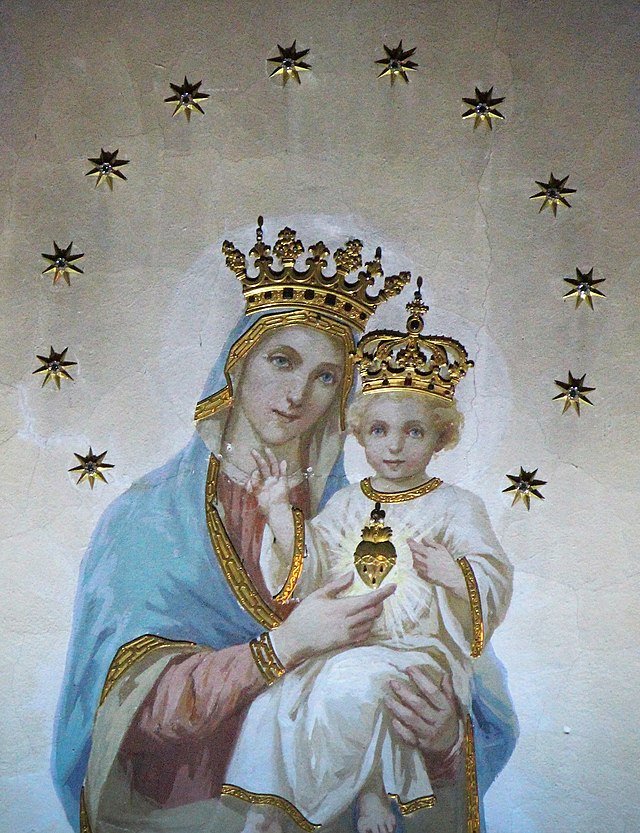
Heart of Jesus, substantially united to the Word of God: As I said earlier, two natures were fused into One Person at the Incarnation. We can’t think about that enough. Also, that Sacred Heart becomes part of us for some fifteen minutes when we receive Communion. I’ll never forget the story of the little boy, who on First Holy Communion day was seen feeling his chest after Holy Communion. He told his mother later, “I felt two hearts beating in there!” Now we probably won’t feel that, but it’s true we have the Sacred Heart beating within us for 15 minutes or so.
Dethroned From Society, the Sacred Heart Demands Reparation
Today we will make a Solemn Act of Reparation to the Sacred Heart of Jesus after Mass. As Pope Pius XI put it so poignantly: “Christ the King has been dethroned from society.” The idea of absolute separation of Church and State where there can’t be any mention of God, is an absolute dethroning of Our Lord — He is denied and His Church is denied. I don’t know of a country left in the world that properly adores and acknowledges Christ as King — that’s how bad it is. There was a time when Catholic countries would acknowledge Christ publicly as King. They would, of course, not persecute non-believers, but at least the official religion was the Catholic religion, which meant that Christ and His Church were acknowledged.
The head of state, the head of the government, would make the Act of Consecration to the Sacred Heart of Jesus: “We acknowledge that Thou art King not only in our spiritual realm but also in our temporal realm.” That’s the way it should be! But today He has been dethroned. That’s the sad reality. We can’t enthrone Jesus as head of the government of the United States of America. We wish we could, but we don’t have that power. But at least by our prayers, our love, our sacrifices, we can offer reparation for His being dethroned . And we need to make reparation for the majority of mankind that have dethroned Him in their hearts. He’s not the King of their hearts. Other things have taken His place. But at least we can say today and every day of our lives: “Jesus, Thou art the King of my heart. O Mary, thou art the Queen of my heart. I make this solemn profession.”
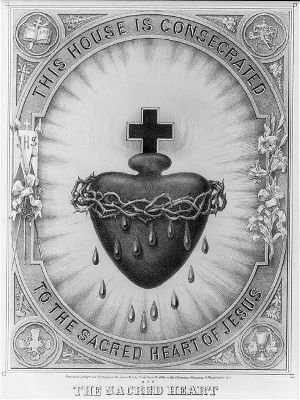
We told Jesus when we were baptized that He would be the King of our hearts. That’s what our baptismal vows mean, and we renew that today. We can renew our baptismal vows often. Let’s renew them at every Holy Communion: “Jesus, Thou art the King of my heart. Help me to love Thee more and to love Mary more; help me to love my neighbor more, as Thou didst teach us to love one another as Thou hast loved us.” At least we can do that. Just offer to Jesus the desire and the wish that one day the world and our country will cast off the shackles of sin and corruption and turn again to the true King and the true Queen. May They reign at least in our hearts through our fervent living of our Faith and of our devotion to Them.
Let us say often in life through our daily living of the Faith what Father Pro said just before he died as a martyr with his arms outstretched–I believe with the Rosary in one hand and the crucifix in the other:
Viva Cristo Rey!
Long live Christ the King; long live the Sacred Heart of Jesus and the Immaculate Heart of His Mother Mary.
–Taken from the Reign of Mary Quarterly Magazine, Issue 161
